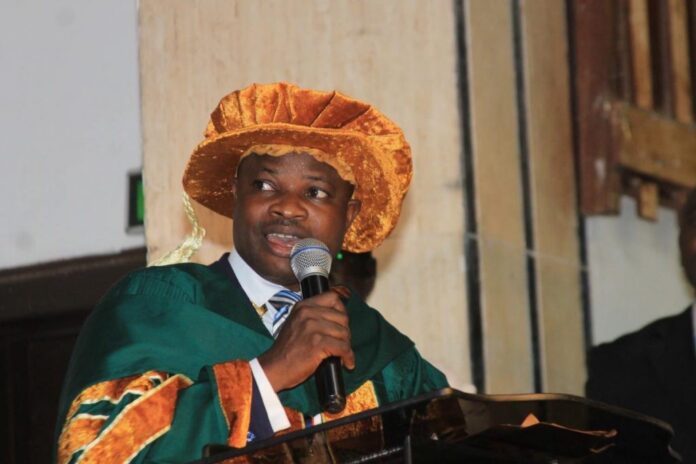Research Is Fundamental To Drive Digital Economy – Prof Aderounmu
TECH DIGEST – In an article titled: ‘The Role of Research in Digital Economy’, Prof. Aderounmu reiterated that the business of operating an economy in the contemporary world is no longer business as usual.
“It has become one of the innovation recipients of the digital age we are in. The ubiquitous digitalisation that is transforming all aspects of life is also transmuting the economic landscape. Economic activities are getting smarter and faster, propelled by the power of an ever evolving digital technology. Knowledge is the new dominant resource or factor of production; digital data is its determination of value. Electronic commerce is the new marketplace.
“The world trades in digital goods and services. Now, critical and large transactions can be conducted on the Internet or at the tapping of digits on mobile devices, as boundaries of space and time collapse into virtualisation and globalisation of economic activities. Social intercourse is increasingly digitalised, while governance and public services are also being delivered smartly with digital technology.
“As digital technology evolves, the modern economy is being transformed by innovative technologies such as Artificial Intelligence (AI), Internet of Things, Blockchain, Augmented Reality, Virtual Reality, Mobile, Big Data, Machine Learning, Robots, Unmanned Aerial Vehicles(Drones), Cloud Computing, Fintech and so on. These powerful technologies are, autonomously or in convergence, instigating improved productivity and business innovation, which in turn are leading to increased employment opportunities, creation of wealth, and formation of greater value and growth in the economy. In the digital economy, governments of nations are also enabled with technologies that help them analyse public policies and improve governance as they deliver better public services to citizens more efficiently”.
Defining the Digital Economy, the Immediate Past Dean, Faculty of Technology at OAU, quoted a World Bank Digital Economy report referencing Ernst and Young, saying “the part of economic output derived solely or primarily from digital technologies (ICT) with a business model based on digital goods or services.”
The report further expatiates that “digital economy is made up of various components, including a platform economy, a gig economy, an industry 4.0, a digital economy, data analytics, robotics and Artificial Intelligence (AI), machine learning, 3-D printing, and e-commerce, among others.”
“In other words, the digital economy as it is today encompasses wide-ranging economic activities that leverage digitised information and knowledge as fundamental dynamics of production. Diverse innovative digital technologies, as earlier mentioned, are deployed to gather data, store data, analyse data, and then share the same data digitally to facilitate more effective interactions and efficient transactions in modern society.”
Beaming the light on ‘The Role of Research’, Prof. Aderounmu, noted that the simple sum total of the role of research in digital economy is that it enables innovation.
“There is no disputing the assertion that research is quite imperative in driving innovation in any sphere of life. In fact, just as there can be no progress or development without innovation, there is no innovation without research. Most, if not all, innovative technologies in history till date are products of research. In the digital economy, research is even more organically indispensable because innovations are what drive, grow and sustain economic digitalisation.
“Universally, due to its acclaimed significance for socio-economic development, research commands great attention among smart nations. That is why, as claimed in the UNESCO Institute for Statistics report, “global spending on Research & Development (R&D) has reached a record high of almost US$1.7 trillion.” The report also adds that about 10 countries contribute 80% of the above-mentioned R&D spending, just as some others have committed themselves to considerably increasing public and private R&D investment together with the number of researchers by 2030, in a drive towards attaining the Sustainable Development Goals (SDGs). This stoutly underscores the crucial role of research in attaining development.
“It is obvious then that if countries of the world could be investing trillions of dollars in Research & Development as reported by UNESCO, the digital economy cannot exist, survive or grow without research. Specifically, research shapes the digital economy in a number of ways. For one, research helps in creating design options for the optimum utilisation of the immense latent possibilities of economic digitalisation. That is why serious organisations and universities always invest in assorted research projects in order to discover new products, new ways of doing things or improving on existing products or processes. In so doing, research facilitates the path to innovations that stimulate the growth of the digital economy.
“So, it is a fact that scientific research delivers new insights. As scientists and researchers within and outside universities engage in research, they develop new knowledge, approaches, systems and technologies with which productivity is improved towards creating better products or services. The strategic outcome is that research helps to deepen the innovation capabilities of nations, while aiding their sustainable prosperity and global competitiveness in the digital economy. It is the reason that developing economies that want to evolve their own digital economies need to provide requisite funding to citizens and institutions with inventive scientific ideas to undertake research and development activities that can yield innovative products to benefit society.
“This naturally brings us to the world of innovation hubs or incubators which are also catalytic players in the research ecosystem in building the digital economy. Research supports incubators which are usually situated in technology parks, such as the OAU ICT-Driven Knowledge Park (also known as an Africa Centre of Excellence) hosted at the Obafemi Awolowo University, Ile Ife, Nigeria”.
















